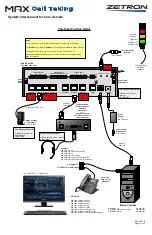
9-4
L60 LINE PHASE COMPARISON SYSTEM – INSTRUCTION MANUAL
OVERVIEW
CHAPTER 9: THEORY OF OPERATION
9
Figure 9-2: Two-terminal line phase comparison
Thus the logic shown in Figures 2A and 2B rarely, if ever, produce a trip output on an internal fault because the 8.33 ms
(which is the time of a half-cycle on a 60 Hz base) requires perfect matching. In actual practice, a 3 to 4 ms setting is used
rather than the 8.33 setting illustrated. This makes it much easier to trip on internal faults. It also makes it much easier to
trip undesirably on external faults. However, experience has indicated that with proper settings and adjustments in the
relay such a timer setting offers an excellent compromise. This can be better appreciated if it is recognized that item (a)
above is generally minimized and item (b) is nonexistent on external faults.
As shown in the next figure, a stability angle setting of 3 ms for a 60 Hz system allows for about 65 electrical degrees of
blocking zone. This provides sufficient security to prevent tripping in the cases indicated above and provides reliable
tripping for all types of internal faults.
In the event that ON-OFF communication equipment were to be employed rather than frequency-shift equipment, the
logic appear as in Figures 2C and 2D. Note in these two figures that the reference to MARK and SPACE have been
conveniently omitted since the receiver output is either present or not as against the case of the frequency-shift
equipment where it can be there in either of two states. Figure 2C illustrates a tripping scheme while Figure 2D a blocking
scheme. Here again, the integrator is, in practice, actually set for 3 to 4 ms.















































